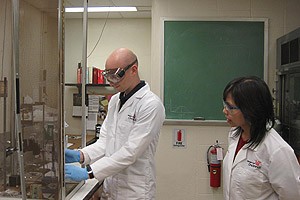
UC Undergrad Helps Develop Exceptionally Tiny Sensor
Timothy Meyung, an undergraduate researcher in the
McMicken College of Arts and Sciences
at the
, is part of a group working to develop tiny electrochemical sensors that may save those with medical implants from having to undergo extra surgical procedures. Led by William Heineman, head of the
, and graduate students Xuefei Guo and Julia Kuhlmann, the group hopes that these sensors will one day monitor the degradation rate of magnesium-based, biodegradable medical implants.
In Dr. Heinemans group, I have been working on the design of solid-state ion selective electrodes. Currently our design involves carbon nanotubes (CNTs) as ion-to-electron transducers, which have great potential to miniaturize ion-selective sensors, says Meyung.
In the past, medical implants were often made of titanium or other non-biodegradable materials, but now there is the option of magnesium-based implants which are biodegradable. With the titanium implants, a second surgery is required to remove the implant once it has done its job. However, the biodegradable nature of magnesium-based implants can potentially alleviate the need for a removal surgery because the implant will degrade inside the body.
According to Meyung, Many patients receive medical implants for different reasons. A main reason that an implant would be required is in the case of broken bones. A titanium implant will be placed in the human to help stabilize the bone structure and facilitate its healing. What is exciting about the magnesium implants is that they will degrade inside the body. This will make a second surgery that is often required to remove the titanium implant not necessary.
For this to happen there must be a way to monitor the degradation of the magnesium implant. That is why it is important for Meyungs team to design such a tiny sensorso it can be implanted into the body as a way to monitor the implants degradation progress.
Eventually, the miniaturized sensors will be tested in the in vitro Corrosion Characterization System (CCS) to determine their effectiveness. The in vitro CCS will be used to replicate the environment of the human body so we can assess the sensors performance and the effects of the implants degradation on surrounding cells.
Heineman has been impressed with Meyungs efforts. [Meyung] recently joined my group and has jumped into undergraduate research with a lot of energy and enthusiasm. Under the guidance of senior graduate student, Xuefei Guo, the sensors that he is developing are very important because of their exceptionally small size. Tim also has a good possibility of generating enough results for co-authorship on a journal article, he says.
The research project is part of an Engineering Research Center (ERC) grant that is funded by the National Science Foundation.
Related Stories
UC Journalism to host Hall of Fame, Young Alumni Awards
Event: April 24, 2025 6:00 PM
The College of Arts and Sciences’ journalism department will host the Hall of Fame and Young Alumni Awards to celebrate the achievements and accomplishments of its graduates. Induction into the UC Journalism Hall of Fame is a special honor reserved for UC alumni who have excelled in the profession of journalism and media, or individuals who have made a significant contribution to journalism at UC.
Bradford pear trees look pretty, smell awful. Why are they...
April 2, 2025
WLWT talks to UC biology Professor Theresa Culley about Ohio's ban on the sale or planting of nonnative and invasive pear trees. The trees are showing up in many parks and wild areas where they are crowding out native species.
Bird-safe glass added to UC building
April 2, 2025
UC biologist Ronald Canterbury tells Fox19 that bird-safe glass in buildings can save untold numbers of birds.
